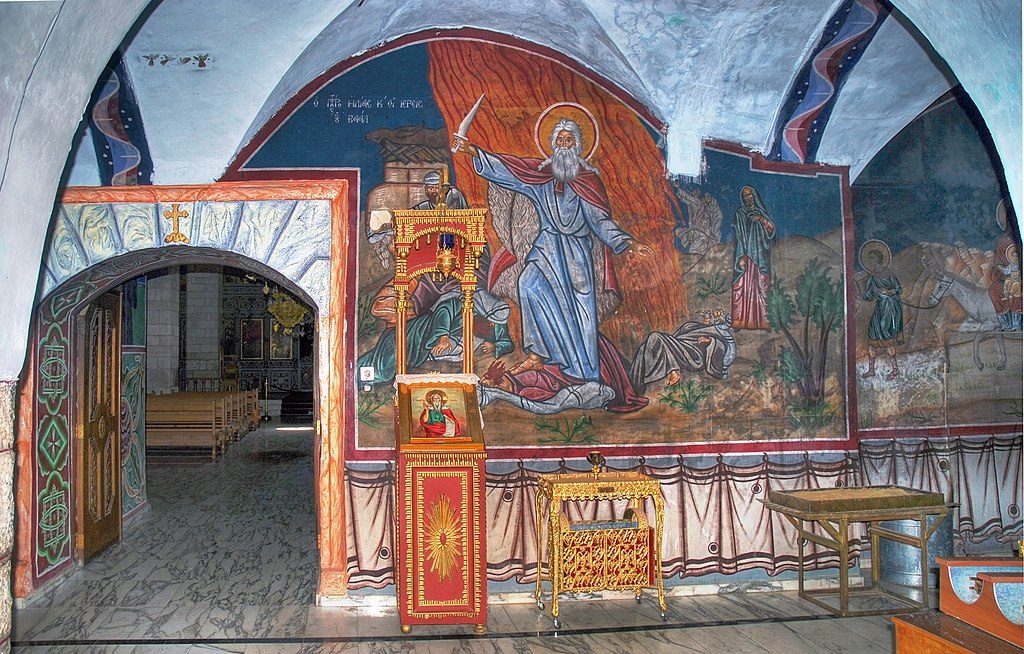Continuing our series on the “Sword of St. Michael,” we will examine the final monastery along the sacred line of seven monasteries that stretches from Ireland to Israel.
[featured-image single_newwindow=”false”]
The end of the “sword” points to a location northwest of Jerusalem. It lands on another mountain surrounded by water. This time the mountain is one of the holiest of all Christendom: Mount Carmel.
In Hebrew the mountain is called Har ha Karmel, which translates roughly to “God’s vineyard,” or simply “the garden.” It has always been regarded as a holy mountain and sometimes thought to be the holiest of all mountains. It is most famous for an episode in the Old Testament involving the prophet Elijah.
In 1 Kings 18 there is narrated a lengthy story about an encounter Elijah had with 450 prophets of the pagan god, Baal. There Elijah challenged the prophets to a contest to see whose god was mightier. After several failed attempts by the worshippers of Baal, God revealed his power in a splendid show of fire.
It is believed that Elijah lived and prayed on this mountain and made it his center of operations. After his death, hermits started to live there for many centuries, but didn’t formalize until the 13th century. They established a monastery under the title of Mary, Star of the Sea and created the religious order of the Order of the Brothers of the Blessed Virgin Mary of Mount Carmel (aka, the Carmelites).
While the mountain does not have a direct connection to St. Michael the Archangel, the prophet who made it famous is connected to a sword.
The coat of arms of the Carmelite Order features a flaming sword at its top. Here’s why:
Above the seal and through the banner is an arm and hand which holds a flaming sword. This too is a symbol of Elijah, his fiery spirit and his passion for the one, true and absolute God whose word “burned like a torch” (Eccl. 48:1). For Carmelites Elijah is the solitary prophet who nurtured his thirst for the one and only God and lived forever in His presence. Elijah is the biblical inspiration of the Carmelite life and, like him, Carmelites seek both to continually carry, in their minds and hearts, “the sword of the spirit, which is the Word of God” (Carmelite Rule) and to live constantly with a loving, contemplative awareness of His presence.
The flaming sword is directly tied to Carmel, as “it recalls the fire which he called down from heaven upon the mountain of Carmel to confound the false prophets of Baal.”
Moreover, what’s interesting is how some historians have discovered that there did exist a worship of a serpent god with the name Baal in the land of Canaan. Whether or not these prophets worshipped this exact god is not known. However, its’ intriguing to think of Elijah with a sword, defeating a serpent god.
Even so, Elijah is often depicted holding a sword aloft, with a pagan worshipper under his feet (see image above).
Sounds similar to how St. Michael defeated the dragon in the book of Revelation.
Carmel is also viewed in the spirituality of the Carmelites as a symbol of heaven, which is fitting to be the end of this “sword” that begins in Ireland and ends on Mount Carmel.
But how did anyone figure out this strange “coincidence” that seven monasteries are linked along a straight line?
We will investigate that mystery in the next few weeks.
Photo: By Ish ha-Teven – Own work, CC BY-SA 4.0

